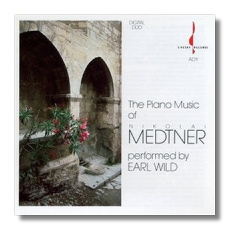
The Internet's Premier Classical Music Source
Related Links
- Latest Reviews
- More Reviews
-
By Composer
-
Collections
DVD & Blu-ray
Books
Concert Reviews
Articles/Interviews
Software
Audio
Search Amazon
Recommended Links
Site News
 CD Review
CD Review
Nikolai Medtner

Piano Music
- Second Improvisation, Op. 47
- Sonate-Idylle, Op. 56
- Vergessene Weisen, Op. 39
Earl Wild, piano
Chesky Records CD AD1 DDD 67:00
Nikolai Medtner's (1880-1951) music presents the listener with an initially frustrating paradox: it sounds familiar – Brahms or Schumann perhaps – yet there is a distinctly 20th Century skittishness about it, the fractured quality of a collage. You could pull your hair out trying to identify him over the radio. In a piece from VergesseneWeisen (Primavera) he delves into whole-tone scales that remind you of a refigured Debussy Arabesque. The vernal imagery, with its suggestion of rapidly flowing streams, is capped off with a lovely coda evocative of Liszt's Au Bord d'une Source. Medtner has a precise recall of classic pictorial devices; yet when he quotes another composer's, he makes it indisputably his. His genius is grafting these neo-Romantic themes and creating an illusion of homogeneity.
Earl Wild is the kind of pianist who delights in such filigree. Always prepared to take chances with lesser known composers, Wild proves that his affinity for Rachmaninoff carries over to Sergei's friend Medtner (they dedicated piano concertos to each other). He displays a flawless sense of rhythm, without the rubatos that critics say render his Chopin "wimpy." The delicate arioso of the Sonata matinata (Op. 39) has a pull to it that Gershwin would have admired. The Op. 47 presents 15 variations on the theme Mermaid's Song. In the virtuoso embroidering of the melody, the plaintive "mermaid" is never lost in the complex textures, a credit to Wild's sensational technique and Medtner's pianistic writing.
The Baldwin piano Wild uses is superbly captured by the Chesky engineers; the upper registers have a faery lightness to them. A label on packaging touts 128-times over-sampling used in the recording process.
Copyright © 1997, Robert J. Sullivan


















